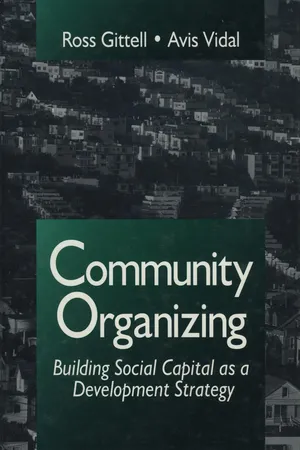
Community Organizing
Building Social Capital as a Development Strategy
- 206 pages
- English
- PDF
- Available on iOS & Android
About this book
Community Organizing provides new insight into an important national challenge how to stimulate the formation of genuinely community-based organizations and effective citizen action in neighborhoods that have not spawned these efforts spontaneously. Since Robert Putnam?s identification of the role of social capital in regional governance and economic development, there has been a virtual industry of interest and action created around the implications of his findings for the development of low-income communities. Yet, there remains a paucity of detailed empirical effort testing and refining his ideas. This book attempts to fill this gap.
Community Organizing distills lessons from a national demonstration program that employed a novel approach to community organizing consensus organizing. Consensus organizing enhances social capital, building both stronger internal ties and capacity in low-income communities and fostering new relations (bridges) between residents of low-income communities and larger metropolitan area support communities.
Using evaluation research and detailed comparative study of community development activity in three diverse demonstration sites, Ross Gittell and Avis Vidal identify key elements of building social capital, which strongly affect community development: comprehension of community development, credibility of effort and participants, confidence, competence, and constructive critiques of efforts. Other elements are more relevant to program management and implementation and include communication among participants, congruence of program effort, management of inherent contradiction, and adjusting implementation to reflect local context.
This book describes the limits and promise of building social capital and will be of interest to community development students and professionals.
Frequently asked questions
- Essential is ideal for learners and professionals who enjoy exploring a wide range of subjects. Access the Essential Library with 800,000+ trusted titles and best-sellers across business, personal growth, and the humanities. Includes unlimited reading time and Standard Read Aloud voice.
- Complete: Perfect for advanced learners and researchers needing full, unrestricted access. Unlock 1.4M+ books across hundreds of subjects, including academic and specialized titles. The Complete Plan also includes advanced features like Premium Read Aloud and Research Assistant.
Please note we cannot support devices running on iOS 13 and Android 7 or earlier. Learn more about using the app.
Information
Table of contents
- Cover
- Contents
- Preface
- Acknowledgments
- Chapter 1 - Introduction
- Chapter 2 - Social Capital and Networks in Community Development: Framing the LISC Demonstration
- Chapter 3 - A Social Capital Perspective on Community Development Practice
- Chapter 4 - Getting Off to a Good Start: Positioning the Program in the Field
- Chapter 5 - Organizing CDCs and Developing Indigenous Leadership
- Chapter 6 - Building Relationships with the Private Sector
- Chapter 7 - Transition and Its Consequences
- Chapter 8 - Lessons:Building Social Capital
- References
- Index
- About the Authors